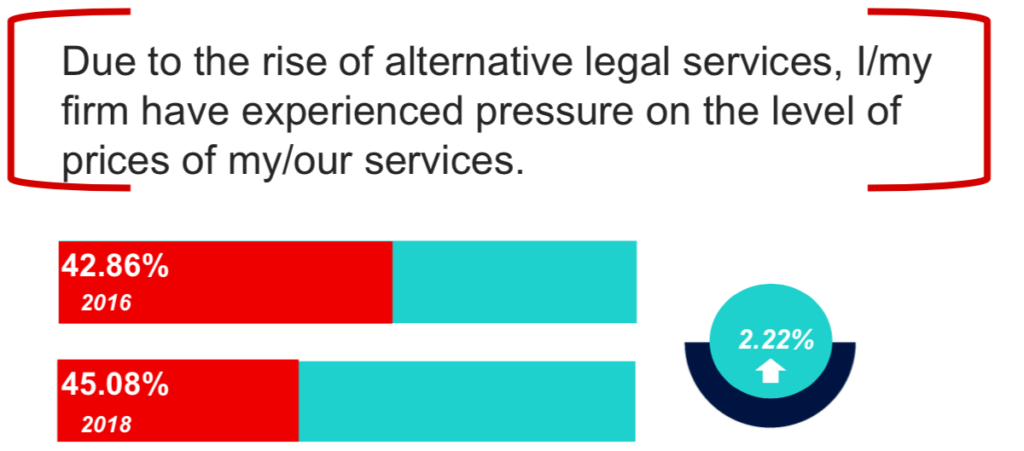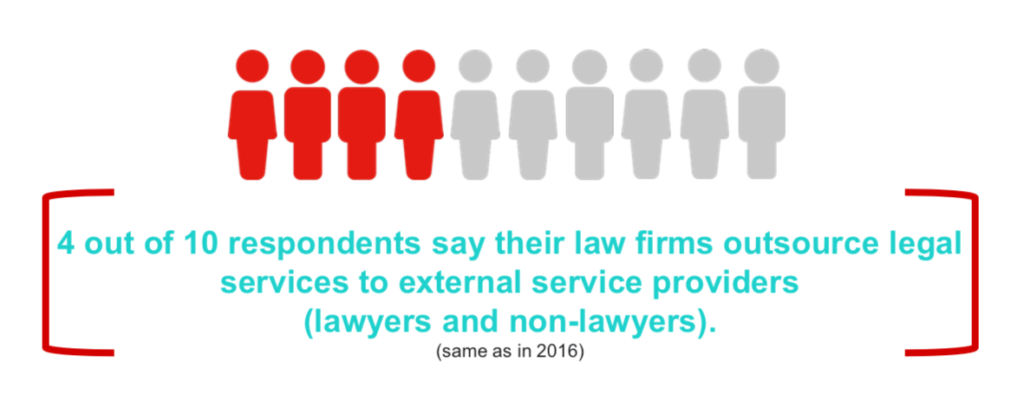
Lawyers embrace the importance of innovation, yet fear its consequences in terms of market change, a survey of lawyers in 48 countries conducted by the International Association of Young Lawyers (AIJA) and the Council of Bars and Law Societies in Europe (CCBE) has found.
The survey which focused on lawyers aged between 25 and 45 from a wide variety of law firms found that ‘the biggest threat to the legal profession’ is ‘resistance by lawyers to innovation’, i.e. the respondents believed that innovation is a good thing and that avoiding it was likely to be an existential threat.
However, the survey also found that the same lawyers also included the steady rise of alternative or NewLaw type businesses as a threat, as well as the commoditisation of legal services, the use of alternative dispute resolution, and the encroachment of ‘non-lawyers’.
It seems that many lawyers, at least from this survey, see law as an ‘us versus them’ type of scenario, where there are regulated professionals competing against any type of business that is not a traditional law firm. Yet, if the legal sector is to truly embrace innovation, of all types – not just technological change – then it almost certainly involves market change as well.
This is even more ironic given that ‘9 out of 10 respondents say their law firms are likely to employ non-lawyers to be part of multi-disciplinary teams providing services to clients (project managers, legal technicians)’. I.e. ‘non-lawyers‘ are fine as long as they are integrated into a traditional law firm.
However, the reality is that the world is slowly realising that many ‘legal‘ services, or legal products one might say, can also be produced very efficiently and correctly by businesses that are not using the traditional law firm model. In fact, there may be few lawyers in sight in the production of some types of legal product.
In addition, one of the key pillars of innovation in the law is the drive toward efficiency and greater productivity, often via technological tools, especially related to automation and the use of AI (NLP/ML) applications as they are well-suited to working in a text-based environment.
A strong focus on efficiency in turn leads to commoditisation, and, one could argue that commoditisation also opens the door to more efficiency, as work processes that are repeatable can be modelled and legally engineered into production lines.

Perhaps the anxiety is a result of the following, only ‘4 out of 10 lawyers feel confident that their law firms are taking the necessary measures to meet the future challenges mentioned in this survey’. Or maybe it’s the pricing pressure (see table above) that more lawyers are now reporting?
So, again, we have this strange mix of wanting innovation, but also a sense of many firms not really implementing real change so as to be in the ‘right shape’ strategically and operationally to operate in a legal sector that is undergoing significant change now.

One more irony is this: as seen in the table above, some lawyers may see alternative legal providers (or law companies – see Elevate) as competitors – but 40% say they are using them nevertheless.
The final paradox is this. The survey also found that ‘42% of respondents are confident that their law firms are taking the necessary steps to introduce new tools or ways of working’ which covered a very broad selection ranging from developing AI tools and using automatisation, to legal project management, and establishing multi-disciplinary partnerships. I.e. they’re indicating change is happening.
Yet, as seen above, the same lawyers also said that the biggest threat they are aware of is resistance to change. Hmm….
Although, one could turn that percentage figure around so that it says: ‘58% of respondents are NOT confident their law firms are taking the necessary steps to introduce new tools or ways of working.’
So, the conclusion. It seems that the legal professionals surveyed here at the end of last year, are divided in several ways.
- While less than half feel their firms are making substantive innovations, more than half do not.
- While many embrace innovation, which in effect means market change (as the two are inextricably linked), they also fear how the very same innovation will increase competition for their traditional law firm models.
- That although some lawyers see the rise of non-traditional legal service providers as competitors they are making use of them nevertheless.
The answer? It would seem that the answer is simply to embrace change and innovation, and if this means changing your business model, then that is a reality that will also have to be embraced – or at least that’s Artificial Lawyer’s view on the matter.
You can’t really have your cake and eat it. You can’t drive efficiency through the standardisation of legal documentation, introduce automation tools (whether AI-driven or other), and ‘change the means of legal production’, without also enabling non-traditional players to succeed in the market which can also leverage these techniques and/or benefit from these changes.
In short, the legal world is changing and law firms can be either part of that change or watch from a distance as things evolve without their engagement.
Last word should go to Xavier Costa, President of AIJA, who said: ‘Human beings have a natural tendency to resist change. Lawyers are no different. The decision to evolve and adapt to an increasingly changing legal landscape is simply good business and lawyers should seek to ensure a sustainable business model for their law firms in the long term.’
‘The rapid changes in technology represent an opportunity for lawyers and their business. We should embrace these advances and make good use of new technologies to provide better services to the society and our clients. Quicker, more transparent and efficient legal services will result in increased trust from clients and, thus, in more business for lawyers.
‘Lawyers must work closely with the industries leading the digital revolution to ensure that the legal principles that had guaranteed decades of stability, peace and economic growth remain adequately implemented in a digital world’, he concluded.
An interesting analysis of the report, RIchard. One of the explanations of the paradoxes you highlight could be the way the survey was constructed. Efforts can be made to avoid contradictory positions if the questions are very specific and root out the right responses. Maybe they were not. That aside, intuitively I think we know that such paradoxes do exist and often a result of personal, professional and company attitudes being misaligned. It would be interesting to see a cut of the data that compares Millennials versus Generation X, as a 25 – 45 age range is almost generational and one would have thought the former to be more progressive. You state that “there may be few lawyers in sight in the production of some types of legal product” and that may well be true, but for any serious, foundational technology that a law firm or an in-house department is going to use, you need domain expertise and that comes largely from lawyers. It explains why last year Seal Software acquired Apogee Legal to get access to an additional 20+ lawyers, AI-literature and doing clever things with policies and models, but nevertheless ex-practicing lawyers with deep expertise in the law. Technology will disrupt the legal profession, just like it has done or is doing in pretty much every other profession. For lawyers and law firms, being part of the solution rather than the problem is to the way avoid an “uberization” and keep ahead.
Thanks, David, great comment too. One thought re. domain expertise, the key issue seems to be crystallising domain knowledge and then leveraging it at scale. E.g. as you say, a team of lawyers developing NLP/ML tools to read text can create a powerful legal application, which can then be used at scale by perhaps a very small number of lawyers (or other professionals) to do a large amount of ‘legal work’. We could call this ‘legal technology gearing’.
I think the paradox of embracing the importance of innovation but resistant it is similar to embracing the importance of a healthy diet – there’s no dispute makes things better, but many people still resist doing it. I also wonder if, like eating healthy, most survey participants interpreted “taking the necessary steps” as “taking steps in some form” without examining their effectiveness.
Also, it sounds like the survey could have better nuanced questions around legal products / non-lawyers. Some of the products are designed to augment lawyer or law firm performance, which would interest lawyers. Other products or services are designed to compete directly against lawyers, which would merit an us-vs-them mentality.